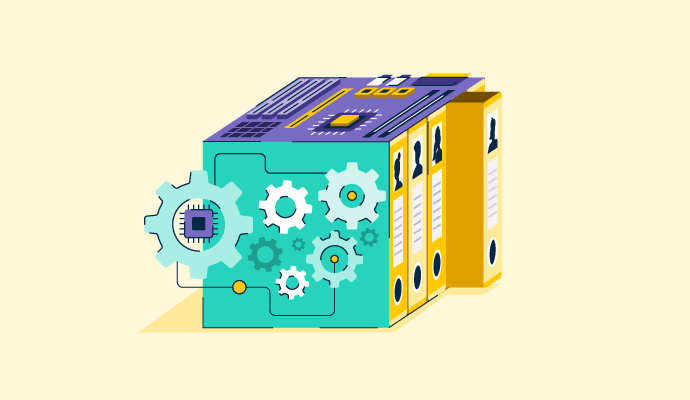Operating systems are the first piece of software that is installed onto a computer by a boot program, the operating system assigns system resources to each application on the computer so they can operate normally. Through utilising the operating system, applications are able to make use of the disk drive, network functionality and manage external devices connected to the computer.
What Are The Functions Of An Operating System
- User Interface: User interfaces make it much easier for the human user to instruct the computer to perform desired processes.
- Security: Operating systems provide the basis for device security as the user can set up security measures such as passwords to prevent unauthorised access. Operating systems can also facilitate a firewall to help protect your computer from outside intrusion. Your operating system will also display a message on your computer if your computer has any system vulnerabilities. You should also download antivirus software onto your computer and read up about common internet scams to further protect the security of your device. If you fall victim to one of these financially, contacting investment fraud attorneys is a good way to get your money back.
- Processor Management: An operating system manages the processing power of the computer, ensuring that each application has enough processing power to run as efficiently as possible. It does this by recording how much processing time each application has used previously to determine how much processing power each application needs in order to function in the future.
- Memory Management: Operating systems help to manage and assign system memory, this is often referred to as random access memory (RAM), this is a form of short-term memory for your computer; allowing your computer to perform important tasks such as loading applications, editing documents and browsing websites.
- Device Management: Computers use a range of input and output devices. Such as keyboards, computer mice, and printers. Operating systems receive requests from such devices, perform a specific task and communicate to the requesting process.
- File Management: Operating systems allow users to keep track of the information that is on the computer. Users are then able to create, delete, transfer and copy the information to suit their preferences.
- Error Detection: Operating systems check the system occasionally for external threats or malicious software activity, if it finds anything suspicious the user will be notified so they can take appropriate steps to fix the problem. Operating systems also check the hardware of the system for any kind of damage.
- Job Scheduling: When multiple applications are running at the same time it is the job of the operating system to manage which actions or jobs are performed first. This depends on the functions of each application and if it is critical to the operation of the computer.
- Network Functionality: Operating systems allow the computer to establish and maintain network connections. During this process, the operating system handles network protocols such as allowing the user to enter a network password. Operating systems also manage the network connections of devices such as printers and wireless keyboards.
- Backup And Recovery: Operating systems aid the process of backing up data on the computer so that it can be recovered in the future in the case of system failures, errors or disasters.
Graphical User Interface (GUI) Vs Character User Interface (CUI)

Graphical User Interface (GUI)
A Graphical User Interface (GUI) is the most common user interface operating system used today. It makes use of graphics, pictures and icons to make the operating system as user friendly as possible. Graphical user interfaces also make use of a pointing mechanism on the screen which is the cursor that is controlled by the computer user moving the mouse that is connected to the computer. On top of this users can also customise this type of interface to suit their needs, changing menu layouts and computer wallpaper graphics. As a result of the computer using processing power to show users information, a graphical user interface requires more memory space and can slow the computer down.
Character User Interface (CUI)
A character user interface is an interface that the computer uses to interact with the applications that are installed on it. Within this interface, the user writes several lines of code which act as a command, and the computer programs installed onto the computer process these command instructions and process a result which causes the computer to complete an action. Character user interfaces do not accept input from pointing devices such as a computer mouse, instead users have to rely on keyboard only input.
Operating Systems On Different Types Of Devices
General Purpose Operating System: General purpose operating systems are the most common types of operating systems on desktop computers and laptops. They come preinstalled on prebuilt computer systems, they help with the running of standardised applications such as word processing programs or video game software.
Mobile Operating System: Mobile operating systems are designed to effectively manage the limited computerised resources that mobile phones offer compared to desktop computers. Due to the reduced processing power of a mobile phone the operating system is more scaled back than on a computer. Resulting in fewer customisation options available for users compared to a desktop PC or laptop.
Point Of Service (POS) Operating System: Point of service devices are often found in customer faced retail outlets, particularly in businesses that sell food and drink. They allow staff that are working there to input customer requests and facilitate payment, such commands are then digitally sent to other areas of the business, such as the kitchen so that they can start making items that the customer has requested.
Conclusion
Operating systems have continued to evolve to be more efficient both from the perspective of the user and the computer itself. Learning about each function of an operating system can help you maximise your utilisation of your computer’s capabilities.

